Read and Succeed
Practices to Support Reading Skills in African American Boys
Terry Husband
ROWMAN & LITTLEFIELD EDUCATION
A division of
Rowman & Littlefield
Lanham Boulder New York Toronto Plymouth, UK
Published by Rowman & Littlefield Education
A division of Rowman & Littlefield
4501 Forbes Boulevard, Suite 200, Lanham, Maryland 20706
www.rowman.com
10 Thornbury Road, Plymouth PL6 7PP, United Kingdom
Copyright 2014 by Terry Husband
All rights reserved. No part of this book may be reproduced in any form or by any electronic or mechanical means, including information storage and retrieval systems, without written permission from the publisher, except by a reviewer who may quote passages in a review.
British Library Cataloguing in Publication Information Available
Library of Congress Cataloging-in-Publication Data
Husband, Terry.
Read and succeed : practices to support reading skills in African American boys / Terry Husband.
pages cm
Includes bibliographical references and index.
ISBN 978-1-4758-0128-6 (cloth : alk. paper) ISBN 978-1-4758-0129-3 (pbk. : alk. paper) ISBN 978-1-4758-0130-9 (electronic) 1. African American boysEducation. 2. LiteracyUnited States. 3. BoysBooks and readingUnited States. 4. African AmericansStudy and teaching. I. Title.
LC2731.H87 2014
371.829'96073dc23 2013031349
 The paper used in this publication meets the minimum requirements of American National Standard for Information SciencesPermanence of Paper for Printed Library Materials, ANSI/NISO Z39.48-1992.
The paper used in this publication meets the minimum requirements of American National Standard for Information SciencesPermanence of Paper for Printed Library Materials, ANSI/NISO Z39.48-1992.
Printed in the United States of America

Contents

Foreword
He was four years old, and unlike his brother and sister, who read at three years old, our third child was reading with less enthusiasm. We were particularly concerned about his engagement in stories because he did not care about words on the page (this has only changed recently). In addition, his reading was hampered by his developmental challenges in making the sounds of certain consonants, diphthongs, and diagraphs. You may be thinking that reading at four years old should be commended, and as an early childhood educator, I agree. But it is not just reading that we strove to support in our children; reading engagement was equally important.
As educators who are also parents of African American children in American schools, we know the challenges and pitfalls that have to be navigated to become proficient on reading assessments, as well as to garner access to the hegemonic reality of Eurocentric ideals of intelligence. In spite of that reality, we nurtured in our children a love for reading for the sake of relevance, enlightenment, enjoyment, survival, imagination, and information gathering. Yet, our success in our childrens reading was supported and nurtured through what we call our village of readers. The village included family members who engaged our children in reading, the librarian who recommended (and still does) relevant and interesting books, teachers who provided reading inventories to access our childrens changing reading interests, and administrators who supported alternative reading assessments (beyond standardized tests) to assess reading proficiency and engagement.
The village of readers is a powerful force in the development of African American children. In this village, there is one goaland that is to raise a reader. There is a semiconscious dedication to the nurturing and development of lifelong readers. I say semiconscious because while the support is not staged, it is purposeful, relevant, and impactful. In addition, the members of the village are critically aware of the plight that African American students, specifically boys, must endure as they navigate reading in schools. While we nurtured our village of readers, many African American students have not had such an opportunity.
Terry Husband, in this timely book, gives us a blueprint to develop a village of readers. His focus on solutions to the systemic problem of low reading engagement for African American boys is a breath of fresh air. While he provides a framework for the purpose of the book, he does not dwell on the negative aspects associated with African American reading achievement. Rather, much of the book describes how to support young readers with relevant and practical information. Largely focused on teachers, Husband provides strategies to improve reading engagement in the classroom and then tackles the issue of reading curriculum improvements. He also offers strategies to support change at an institutional level that will affect the culture of school and, ideally, support a critical awareness of reading culture for the school community.
What is most impressive about this book is the attention given to parents. Husband uses a chapter to support and build a capacity for parents to nurture their children and collaborate with the school, library, administrators, and community. Here he displays the blueprint for creating a village of readers and supports a capacity for schools, families, and communities to augment reading practices to support African American boys. As a bonus, Husband explores the often-neglected subject of writing and its relationship to reading engagement. I have a fundamental belief that we write as well as we read. Thus, if we are going to influence comprehensive reading, we must investigate effective writing strategies. This point is not lost in this book, as Husband approaches writing through a culturally relevant framework and does a masterful job at discussing the intricate relationship with reading and writing.
Not until I read this book did I believe that a village of readers could be scaled up to encompass a larger set of players. Husband has written another book that brims with insight, one that could be written only by someone who has the experiences of a teacher of African American boys as well as the life experiences of an African American student in American schools. He shows us all that it takes a village to raise a reader.
Stephen Hancock, PhD
Assistant Director, The Urban Education Collaborative
Associate Professor of Multicultural Education, University of North Carolina, Charlotte

Acknowledgments
First and foremost, I thank my Lord and Savior Jesus Christ. I can do nothing without you! I would like to thank my wife, Virlaria, for being my friend, partner, and greatest supporter. I cannot imagine what my life would be like without her continual support, patience, and encouragement. I am truly blessed to have such a loving and caring person in my life. I thank my daughters, Gabby and Elyse, for being pure sources of joy in my life. I thank my mother, Vivian Husband, for always encouraging and supporting me. No one could pray for a better mother on Earth. I thank my dad, Terry Husband Sr., for your selflessness, wisdom, sacrifice, and diligence. In a day and time when so many sons grow up without fathers, I thank you for being a true father in every sense of the word. I thank my brother Terrell for all of your help and support as a younger brother. I have always admired you for being such a strong, independent person.
I thank Cynthia Dillard, Rebecca Kantor-Martin, and Barbara Seidl for demonstrating a way of being within the academy that values all human beings. The seeds that you planted early in my academic career continue to bear fruit to this very day. I thank Rich Milner, Tyrone Howard, and Stephen Hancock for being mentors and role models for me throughout my career. You each continue to make indelible marks on how I think and act within these academic spaces. I thank Michael P. Jackson for being such a sincere friend and brother throughout the years. Thank you for making that walk with me time after time.
Next page
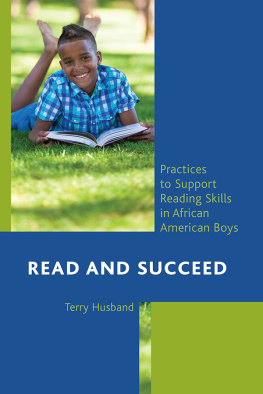

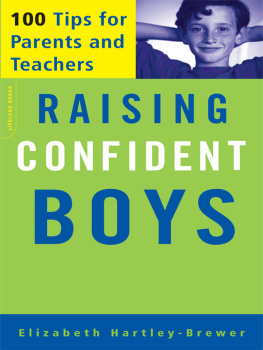
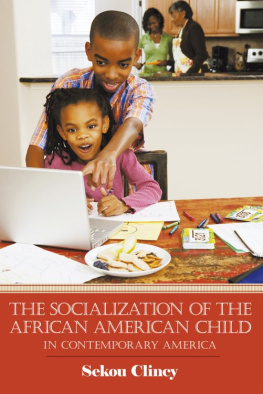
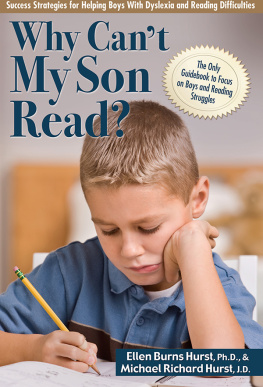
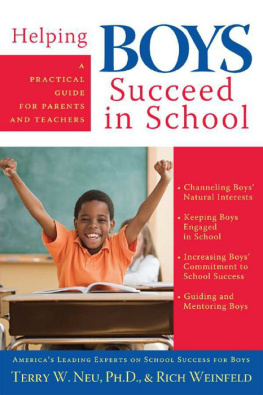
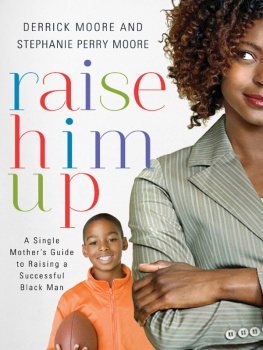
 The paper used in this publication meets the minimum requirements of American National Standard for Information SciencesPermanence of Paper for Printed Library Materials, ANSI/NISO Z39.48-1992.
The paper used in this publication meets the minimum requirements of American National Standard for Information SciencesPermanence of Paper for Printed Library Materials, ANSI/NISO Z39.48-1992.

